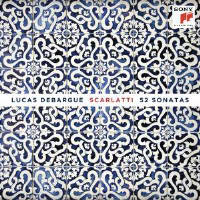Texte paru dans: / Appeared in: |
|
|
Reviewer: David
Reznick
Having been a public school
teacher from the Ice Age to about the Bobby Soxer era, I can tell you that
the greatest thing about introducing my young charges to the best that has
been taught and said is summer vacation. Don’t let any teacher tell you how
he slaves away on lesson plans while the rabble is taking its dolce
farniente on the Mexican Riviera. Bushwa! They love it as much as the third
grader who looks down the road and sees three months worth of loafing,
eating, and multiple daily doses of Judge Judy. Americans in general love
their holidays and often invent new ones. So when I received my marching
orders from Tenafly and found not one but two recordings of piano sonatas by
Domenico Scarlatti—between the two, about a hundred of them, I thought it
might be Scarlatti’s birthday or something. But, apparently, just a
coincidence.
In the red corner, wearing a
Superman costume with a big red clef on his chest, the pride of Germany,
known as the Fun Hun—Christoph Ullrich! And in the blue corner, wearing lacy
(but masculine) underwear, the Parisian je ne sais quoi —Lucas Debarque!
I spent two delightful days in
the company of these two gentlemen. They are perhaps the finest pianists
their countries have to offer; and they have definite ideas about how
Scarlatti should be played. In the hands of these virtuosi, Scarlatti sounds
like two different composers. Ullrich, who probably practiced rapidity
études until his fingernails fell off, plays these sonatas with such speed
and apparent ease that it’s all the listener can do to keep up. This
rapidity is the most noticeable detail of his art; and when it is combined
with a steady crescendo, the power it generates is like a tsunami,
overwhel-ming and thrilling. Debarque sees these works as opportunities to make personal statements. He, like Ullrich, can play like the wind, but more often, he plays more slowly, often leaving tiny pauses within the phrases. And immediately the first thing one notices is the continuous use of rubato, something not usually found in this repertoire. This helps him to bring out the beautiful and often unexpected harmonies and adds emotional depth where we have not heard it before. Finally, I would note that when I reviewed the Ullrich I made the point that the accompanying notes were outstanding. And now I’ll add that the notes in the Debarque set are every bit as excellent. So what’s your choice? If you love Scarlatti, it’s easy: get both of them. Read and listen long enough, and you might eventually find yourself conducting an advanced Scarlatti seminar. | |
|
|
|
|
|
|
|
Cliquez l'un ou l'autre
bouton pour découvrir bien d'autres critiques de CD |
|




